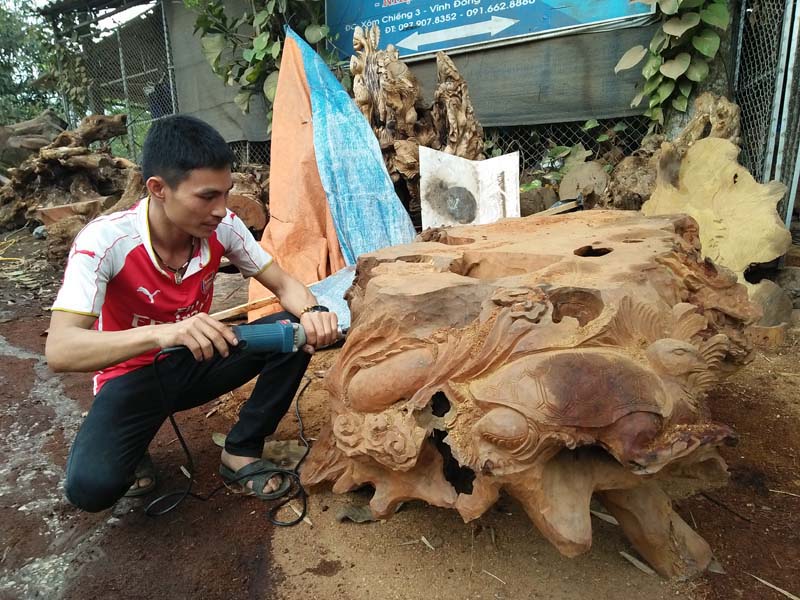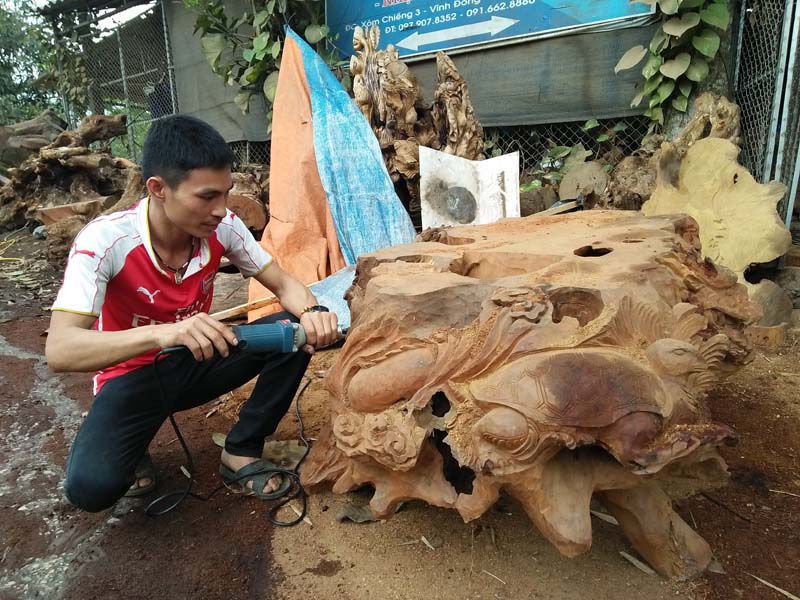
(HBO) - We have visited Tu Tam Fine Furniture Cooperative in Doan Ket hamlet, Vinh Dong commune. This is considered to be one of the most typical and outstanding groups in studying and following Ho Chi Minh's ideology, morality and style in the period of 2016-2018.
 The products of Tu Tam Fine Art Furniture Cooperative are eye
catching, delicate and popular among customers.
The products of Tu Tam Fine Art Furniture Cooperative are eye
catching, delicate and popular among customers.
Tu Tam Fine Art Furniture Cooperative was established in
September 2018, formerly known as Tu Tam Fine Art Furniture Workshop owned by
Mr. Bui Van Tu. This is the first cooperative in Vinh Dong commune to start a
successful business with wood carving profession, bringing the annual revenue
of about 500 million VND. The cooperatives has trained and helped many young
people in the commune and the surrounding areas to learn wood carving, creating
stable jobs for 8-13 skilled workers with a monthly salary of between 4.5 and
10 million VND each person. The cooperative’s products are diverse: Buddha
statues, Tam Da statues, the zodiac, tables and chairs made from tree stumping,
the natural driftwood furniture and so on.
Besides, the cooperative also
receives wood carving according to the customers' requirements. The materials
are mainly taken from the locality. With the skillful and creative hands, Mr.
Tu and his coworkers have produced many products with high economic value,
favored by customers inside and outside the province. There are products worth
from a few dozen to hundreds of millions of VND such as "Wood collapsed” from
tree stumps, tables and chairs from tree stumps, Tam Da statue, Buddha Maitreya
statue... A lot of items have been consumed in "fastidious" markets
like Hanoi, Ho Chi Minh City ...
Mr. Tu says thanks to the support of the local government,
Tu Tam Fine Art Furniture Cooperative has gradually stabilized and brought
economic efficiency for the families, ensuring the lives of workers at the
workshop up till now. It has also created the conditions for the in need of
vocational training and vocational practicing in the locality, creating stable
jobs for young people in Vinh Dong area and surrounding areas.
Mr. Tu also says "In addition to the initial success, we
have also encountered many difficulties, especially in terms of capital,
equipment, the lack of technology and the skilled workers have not really
guaranteed. My biggest desire is to be supported with loans to expand the
production, creating vocational training conditions as well as jobs for young
people and attracting the knowledgeable manpower and skilled workers to work at
the workshop”.
According to data from the Hoa Binh Provincial Party Committee, the industrial production index for the first six months of 2025 is estimated to have increased by 20% compared to the same period last year. This marks the highest year-on-year growth rate for this period since 2020.
In the first six months of 2025, Hoa Binh province’s export turnover was estimated at 1.145 billion USD, marking an 18.11% increase compared to the same period in 2024. Import turnover was estimated at $ 804 million, a 17.15% increase, which helped the province maintain a positive trade balance.
The lives of the ethnic minority farmers in Tan Lac district have gradually improved thanks to the new directions in agricultural production. This is a testament to the collective strength fostered through the professional associations and groups implemented by various levels of the district’s Farmers’ Union.
With the motto the "product quality comes first,” after nearly one year of establishment and operation, Muong village’s Clean Food Agricultural and Commercial Cooperative, located in Cau Hamlet, Hung Son Commune (Kim Boi district), has launched reputable, high-quality agricultural products to the market that are well-received by consumers. The products such as Muong village’s pork sausage, salt-cured chicken, and salt-cured pork hocks have gradually carved out a place in the market and they are on the path to obtaining the OCOP certification.
In the past, the phrase "bumper harvest, rock-bottom prices" was a familiar refrain for Vietnamese farmers engaged in fragmented, small-scale agriculture. But today, a new spirit is emerging across rural areas of Hoa Binh province - one of collaboration, organisation, and collective economic models that provide a stable foundation for production.
Maintaining growing area codes and packing facility codes in accordance with regulations is a mandatory requirement for agricultural products to be eligible for export. Recently, the Department of Agriculture and Environment of Hoa Binh province has intensified technical supervision of designated farming areas and packing facilities to safeguard the "green passport" that enables its products to access international markets.



 The products of Tu Tam Fine Art Furniture Cooperative are eye
catching, delicate and popular among customers.
The products of Tu Tam Fine Art Furniture Cooperative are eye
catching, delicate and popular among customers.